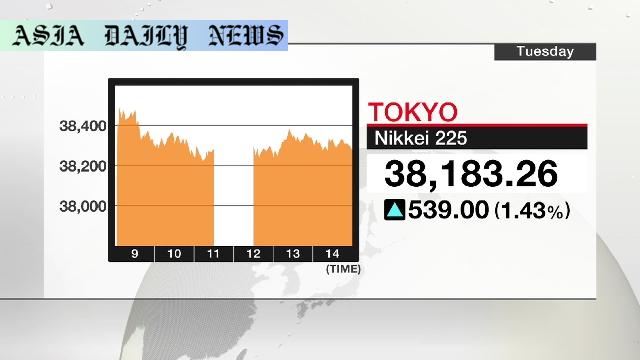US-China Tariff Deal: The world’s two biggest economies agree to significantly cut tariffs and temporarily suspend others.

Introduction to the US-China Tariff Deal
The recently announced agreement between the United States and China to reduce and suspend certain tariffs has created a ripple effect in global financial markets. The move, which aims to de-escalate trade tensions between the world’s two largest economies, temporarily reduces fears of an all-out trade war that could stifle global economic growth. This historic deal has far-reaching implications, not only for the two nations involved but for other global markets that are deeply interconnected with their economies.
Financial markets responded positively to the announcement. In Japan, the Nikkei 225 benchmark rose significantly, continuing its upward momentum for four consecutive days and closing at a notable high. Similarly, the US stock market saw substantial gains, with the Dow Jones Industrial Average climbing sharply, showcasing investor confidence in the potential economic stability the deal might bring. Currency markets also reacted, with the US dollar appreciating against the Japanese yen, marking its highest level in approximately a month.
Impact on Global Markets and Investor Sentiment
The announcement revitalized investor optimism across major financial centers. In Tokyo, the Nikkei 225 index closed at 38,183, up an impressive 1.4 percent, marking a four-day winning streak. This surge followed a strong rebound in the US markets, where the Dow Jones Industrial Average jumped by 2.8 percent from its previous close. Both markets reflect investor relief at the reduction in trade tensions, which have posed risks to global trade and economic stability for over a year.
Currency markets were equally enthusiastic. The US dollar saw increased demand, climbing to the mid-148 level against the yen. This marked its highest value against Japan’s currency in a month, highlighting confidence in the US economy. Such developments underscore the interconnectedness of global markets and the far-reaching implications of trade policies pursued by the world’s leading economies.
Japan’s Perspective and Trade Negotiation Outlook
While Japan benefited from the surge in local stock markets, the government is closely analyzing the Washington-Beijing deal as it prepares for its third round of tariff negotiations with the US. Japanese Trade Minister Muto Yoji remained cautious, stating that it would be premature to draw conclusions about how the US-China agreement might influence Japan’s ongoing trade talks. He emphasized the importance of protecting Japan’s national interests while striving for an expedited resolution.
Japanese officials are considering the potential shift in Washington’s tariff strategies. Some view these changes as a response to fears of slowing growth in the US economy. As a major trading partner with both the US and China, Japan is strategically positioned to navigate these trade developments while safeguarding its economic priorities.
Broader Implications for Global Trade
The US-China tariff agreement alleviates immediate economic pressures and sends a broader signal of willingness to negotiate. The deal’s temporary nature indicates ongoing complexities and unresolved matters in their trade relationship. If the agreement holds, it may set a precedent for other nations to pursue similar strategies to resolve trade disputes without escalating tensions.
However, persistent instability in global trade policies continues to pose challenges for businesses reliant on cross-border commerce. Investors and policymakers alike will watch closely to see whether the positive market reactions triggered by the announcement translate into long-term economic positives. For now, financial markets appear to have embraced the development as a step towards reducing global economic uncertainty.
Commentary
The Significance of the US-China Tariff Agreement
The recent US-China trade deal represents a significant step towards de-escalating one of the most concerning trade disputes in recent years. As the world’s two largest economies, any tensions between Washington and Beijing have massive ripple effects that can disrupt multiple industries and economies globally. By agreeing to cut and suspend tariffs, both countries have showcased a willingness to prioritize economic stability over prolonged confrontation.
Markets have reacted strongly, with equities in both Asia and the US posting impressive gains. The Dow Jones Industrial Average’s sharp increase and the Nikkei 225’s continued climb signal a wave of optimism among investors. However, it’s worth noting that this positivity stems more from relief at avoiding an immediate escalation rather than the resolution of deeper issues. Questions remain about the long-term viability of the agreement and whether both nations can sustain this cooperative momentum.
Japan’s Role in the Evolving Trade Dynamics
Japan finds itself in a unique position amid these developments. As a key trading partner of both the US and China, Japan’s economic health is closely tied to the stability of their relationship. While the markets have propelled Japanese stocks higher, the government appears cautious, focusing on how this deal might influence its ongoing trade negotiations with the US.
Trade Minister Muto Yoji’s comments illustrate the delicate balance Japan must maintain: protecting its own national interests while striving for constructive negotiations. The evolving US strategy—potentially motivated by concerns over its own economic performance—provides Japan with an opportunity to leverage its position. If carefully managed, Japan could gain favorable trade concessions while contributing to the broader goal of stabilizing global trade relations.
Looking Ahead
The current US-China tariff agreement is an encouraging step in the right direction, but it is far from a comprehensive resolution. Policymakers and businesses alike must navigate an unpredictable landscape, characterized by shifting alliances and national priorities. For global markets, the key question remains whether this temporary pause in tensions can evolve into meaningful and lasting economic cooperation.
From a broader perspective, the deal underscores the importance of diplomacy in resolving high-stakes economic disputes. As nations like Japan prepare for their own negotiations, they must learn from the successes and pitfalls of the US-China process. Ultimately, the goal should be to foster trade partnerships that benefit all parties, ensuring global economic resilience in the face of future uncertainties.


